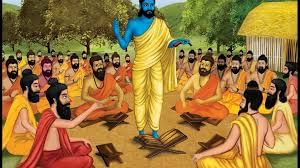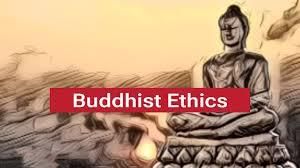UPSC Exam > UPSC Notes > UPSC Mains: Ethics, Integrity & Aptitude > Ethics in Indian Philosophy
Ethics in Indian Philosophy | UPSC Mains: Ethics, Integrity & Aptitude PDF Download
| Table of contents |

|
| Ethics in Indian Philosophy |

|
| Purusharthas |

|
| The Idea of Nishkama Karma (disinterested performance of duties) |

|
| Buddhist Ethics |

|
| Jaina Ethics |

|
| Charvaka Ethics or Lokayatmat |

|
Ethics in Indian Philosophy
- In the Indian perspective, an individual's duties extend beyond human society to encompass all sentient beings. Indian philosophy teaches, "Love thy neighbor as thyself, and every living being is your neighbor." Moral philosophy in India is essentially the practice of living a good and disciplined life.
- The Indian approach to moral philosophy differs from Western philosophy. While Western ethics is an intellectual pursuit, Indian philosophy sees it as a way of life aimed at realizing the ultimate reality.

Indian Schools of Philosophy
- Indian Schools of Philosophy are generally divided into Orthodox (Astika) and Heterodox (Nastika) categories. Six main philosophical systems—Mimamsa, Vedanta, Samkhya, Yoga, Nyaya, and Vaisheshika—are considered Orthodox schools of Indian Philosophy. These schools accept the authority of the Vedas, which is why they are referred to as Orthodox or Astika schools.
- On the other hand, three major philosophical systems—Charvakas, Bauddha, and Jainas—are classified as Heterodox schools. These schools do not recognize the authority of the Vedas, which is why they are known as Heterodox or Nastika schools.
Features of Indian Ethics: Orthodox and Heterodox
All Indian systems of thought, whether Orthodox or Heterodox, share certain common features. The characteristics of Indian Ethics can be outlined as follows:
- Indian ethics is the oldest moral philosophy in the history of civilization. The chronology of Orthodox and Heterodox schools (except for Lord Buddha, around 487 BC) is difficult to determine. The long history of Indian ethics has led to its deep integration into the practical life of its followers. Every school of Indian Philosophy upholds the endurance of ethical ideals, which remain unchanged even today.
- Indian thinkers propose practical methods for achieving a life of perfection in this world. The ethical rules of conduct have been followed by disciples of Yoga, Jainism, and Buddhism for thousands of years. The goal of Indian moral philosophy is not only to discuss moral ideals but also to walk the path that leads to these ideals.
- Indian ethics has a strong and profound metaphysical foundation. Each philosophical school points to metaphysical ideals that are meant to be experienced. There is a synthesis of theory and practice, combining intellectual understanding with direct experience of the ultimate reality (such as Kaivalya, Nirvana, etc.). In Indian Ethics, intellectualism and moralism are the two guiding forces that help the soul in its spiritual journey.
- Indian ethics is absolutist and spiritualistic. It aims at realizing the supreme reality by transcending pleasure, pain, right, wrong, good, and evil. The realization of these ideals is achieved through spiritual discipline.
- Indian ethics is humanistic. It seeks a balance between the inner and outer life of the individual, as well as between individual and social life. The moral code is prescribed in a way that ensures both individual progress and social welfare, leading to harmonious living. The ultimate goal of morality is the well-being of humanity.
- Indian ethical thinkers advocate for non-violence, love, compassion, and goodwill for all living beings. This compassion extends beyond humans, including plants, animals, and all visible and invisible forms of life.
- Indian thinkers believe in the Law of Karma, which means that every action, whether good or bad, produces its own consequences in an individual's life, especially when performed with a desire for outcomes. This universal moral law governs the lives of all individuals. The Law of Karma is a force generated by actions that have the potential to bear fruit, representing the conservation of moral values. Except for the Charvakas, all Indian schools accept the Law of Karma.
Purusharthas

- Indian thinkers were not only focused on understanding the Ultimate Reality but also on realizing it. Philosophy, in their view, is an art of living a good life. They prescribed Four Supreme Ends, known as Purusharthas: Dharma, Artha, Kama, and Moksha. The term "Purushartha" refers to the goals or ends that every human being, regardless of gender, should strive for. Purusharthavada is a comprehensive Indian theory of human values.
- According to this philosophy, humans are rational, social, moral, and spiritual beings, and their needs must be met. A good life is achieved through the pursuit of these four Supreme Ends. Artha addresses material needs, Kama fulfills psychological needs, and Moksha focuses on spiritual satisfaction. Dharma, which represents virtue, accompanies an individual throughout their life.
Dharma
- The term 'Dharma' is derived from the root 'dhr,' which means to hold together, sustain, and nourish. Literally, 'Dharma' means "That which holds together." It serves as the foundation of harmony in individual life and order in society, making it the basis for both social and moral order. ("Dharanat Dharma Ityahuh"). As the Supreme End, Dharma represents the principles that foster harmony in social relationships and the integrity of an individual's character.
- Among the four Purusharthas, Dharma is always listed first and is given priority because all human pursuits must align with moral values and principles. Dharma is considered the unique characteristic of human beings. While all living beings engage in basic activities such as eating, sleeping, experiencing sorrow, and sex, Dharma distinguishes humans. It signifies moral and reflective awareness. Humans are rational and spiritual beings who are not satisfied with merely fulfilling biological needs like hunger, sex, and safety. They have higher needs—psychological, moral, and spiritual.
The Idea of Nishkama Karma (disinterested performance of duties)
- The Bhagavad Gita is the most popular and influential religious text in Hinduism, encapsulating key elements of Hindu philosophy. Renowned Indian thinkers such as Shankaracharya, Ramanuja, Madhava, and Dnyaneshwar have written insightful commentaries on the Gita. Prominent national leaders like Lokmanya Tilak and Mahatma Gandhi drew inspiration from its teachings. The philosophical content of the Gita largely comes from the Upanishads, and it also incorporates elements from various schools of philosophy, including Sankhya and Yoga.
- The Gita advocates the path of Nishkama Karma, which means performing one’s duties selflessly, without expecting the results of one's actions. It teaches that duties should be carried out without selfish motives, and the fruits of actions should be offered to the Divine. While we have the right to perform our duties, we do not have any control over or entitlement to the outcomes of our actions. Actions are within our control, but their results are not.
- The ideal of the Gita is to perform duties with a detached spirit. It does not advocate renunciation of action but rather renunciation within action. The Gita does not encourage abandoning everything, but instead encourages renouncing selfish desires and the attachment to the results of actions. An individual should let go of expectations regarding rewards and focus on performing their prescribed duties.
- Gita's ethics is neither hedonistic nor ascetic. It rejects both the excessive pursuit of pleasures and the total suppression of desires. Instead, it advocates for the controlled satisfaction of human desires. The ethics of the Gita promotes both individual and social welfare.
Buddhist Ethics

- Buddhist ethics is compassionate and humanistic, centered around the gospel of love. Buddha's teachings emphasize cultivating genuine love for all of creation and offer insights into the nature of sorrow, its origin, its cessation, and the path leading to its end.
- The core ethical guidelines in Buddhism are known as the Five Precepts, which encapsulate the ethical principles of the tradition. These precepts are not rigid rules or commandments but principles of training that individuals choose to follow freely, applying them with intelligence and sensitivity. Buddhism recognizes that life is complex and presents many challenges, so it does not propose a single solution for all situations. Instead of focusing on actions being strictly right or wrong, Buddhism speaks of actions as being skillful (kusala) or unskillful (akusala).
- The Five Precepts are:
- Not killing or causing harm to other living beings: This fundamental ethical principle underpins all the others, with love as its positive counterpart.
- Not taking what is not given: This includes stealing and exploiting others. The positive counterpart is generosity.
- Avoiding sexual misconduct: This involves respecting commitments in sexual relations, with contentment being the positive counterpart.
- Avoiding false speech: Truthfulness is the essential counterpart of this precept, promoting an ethical life.
- Abstaining from intoxicating drinks and drugs: The counterpart here is mindfulness or awareness, a key quality developed on the Buddha's path. Intoxicants tend to hinder mindfulness, making this precept an important practice.
Jaina Ethics

- Jaina ethics is focused on the liberation of the individual and is fundamentally religious in nature. Its goal is to spiritualize all aspects of life to prepare the individual for the ultimate aim of liberation. The primary principle, applicable to both kings and commoners alike, is "Do your duty and do it as humanly as you can." Jaina ethics is deeply rooted in its metaphysical framework and serves the ultimate purpose of spiritual liberation.
- Jaina ethics evolved from the rules for ascetics, known as the Mahavratas or the five great vows:
- Ahimsa – Non-violence
- Satya – Truth
- Asteya – Non-stealing
- Brahmacharya – Celibacy
- Aparigraha – Non-possession
- These ethical principles are practiced not only through physical actions but also through speech and thought. For example, ahimsa must be observed through the mind, speech, and body. The other ethical guidelines for both ascetics and laity are derived from these five vows.
- Jainism does not encourage moral behavior out of fear of God, reverence for divine character, or simply for altruistic or humanistic reasons that benefit the community or state. Instead, moral observance is seen as an egoistic imperative, aimed at self-liberation and spiritual growth.
Charvaka Ethics or Lokayatmat
- Among all the schools of Indian Philosophy, whether Orthodox or Heterodox, the Charvaka School occupies a unique position. It advocates Atheism, Materialism, and Hedonism. The views of the Charvakas are often criticized by other schools of thought. The original texts of the Charvaka school are not available, and their philosophy is known primarily through the criticisms of other philosophers. The Charvaka perspective is also referred to as "Lokayatmat," which asserts that only this world (Loka) exists.
- Indian thinkers typically advocated four Supreme Ends (Purusharthas): Dharma (Virtue), Artha (Wealth), Kama (Desire), and Moksha (Liberation). However, the Charvakas reject Dharma and Moksha as supreme ends, accepting only the empirical world and the physical body as the essence of existence. They accept Kama (pleasure) as the primary goal of life, with Artha (wealth) seen as a means to achieve sensuous enjoyment. Therefore, Artha is considered subordinate to Kama.
- According to the Charvakas, human existence is limited to the physical body and this life, making physical pleasure the only true good. The ultimate goal of human life is to maximize pleasure and minimize pain in this life. As a result, the Charvakas advocate Gross Egoistic Hedonism. This makes the Charvaka School the only school in Indian tradition that explicitly promotes a hedonistic ethical outlook.
The document Ethics in Indian Philosophy | UPSC Mains: Ethics, Integrity & Aptitude is a part of the UPSC Course UPSC Mains: Ethics, Integrity & Aptitude.
All you need of UPSC at this link: UPSC
|
78 videos|139 docs
|
FAQs on Ethics in Indian Philosophy - UPSC Mains: Ethics, Integrity & Aptitude
| 1. What are the Purusharthas in Indian philosophy and why are they significant? |  |
Ans. The Purusharthas refer to the four goals of human life in Indian philosophy: Dharma (righteousness), Artha (wealth), Kama (pleasure), and Moksha (liberation). They are significant as they provide a framework for living a balanced and meaningful life, where one can pursue material and spiritual goals harmoniously.
| 2. What is the concept of Nishkama Karma in Indian philosophy? |  |
Ans. Nishkama Karma is the principle of performing one's duties without attachment to the results. It emphasizes selfless action and is often associated with the teachings of the Bhagavad Gita. This concept encourages individuals to focus on their responsibilities while maintaining equanimity, regardless of the outcomes.
| 3. How does Buddhist ethics differ from other Indian philosophical systems? |  |
Ans. Buddhist ethics is centered around the Four Noble Truths and the Eightfold Path, emphasizing the cessation of suffering and the importance of compassion (karuna) and loving-kindness (metta). Unlike some other Indian philosophies, which may focus on dharma or rituals, Buddhism prioritizes personal experience and inner transformation.
| 4. What are the key principles of Jaina ethics? |  |
Ans. Jaina ethics emphasizes the concepts of Ahimsa (non-violence), Aparigraha (non-possessiveness), and Satya (truthfulness). It advocates for the protection of all living beings and encourages individuals to live a life of minimal harm and maximum compassion, reflecting a deep respect for life and the interconnectedness of all entities.
| 5. What is Charvaka or Lokayata ethics, and how does it view morality? |  |
Ans. Charvaka or Lokayata ethics is a materialistic and atheistic philosophy that emphasizes empirical evidence and sensory perception. It rejects metaphysical concepts and focuses on the pursuit of pleasure and well-being in this life. Morality, in this view, is based on practical considerations and the consequences of actions rather than adherence to religious doctrines.
Related Searches















